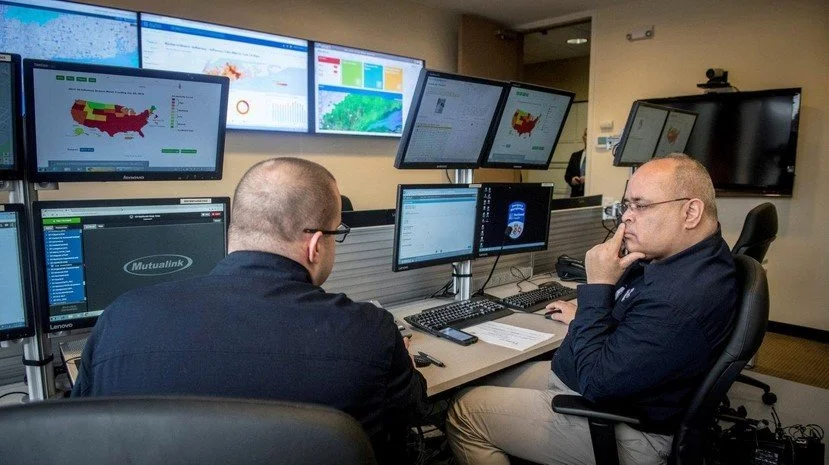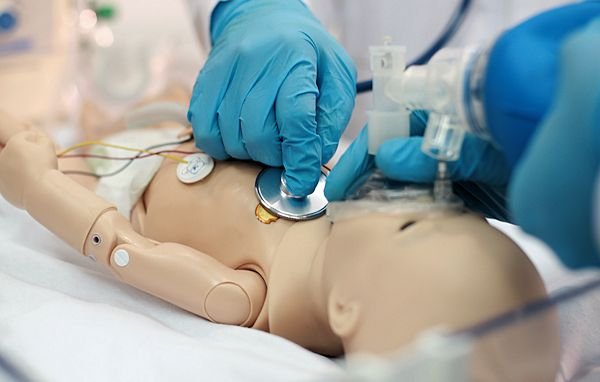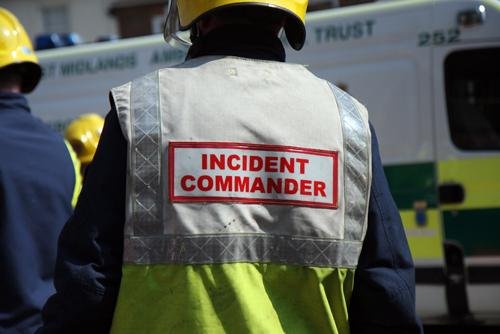Training Calendar
Please note: upcoming events are listed chronologically underneath our calendar.

Introduction to Radiological Nuclear WMD Operations
Introduction to Radiological Nuclear WMD Operations is an awareness level course designed to provide fundamental knowledge to personnel who may encounter a radiological or nuclear incident during their normal duties. The course focuses on preparing responders for the initial stages of a radiological/nuclear Weapons of Mass Destruction Incident. Key topics include: Radiation Fundamentals, Health Effects, Hazard Identification and Protective Acitions.

G-2300:Intermediate EOC Functions
The goal of this course is to assist individuals and jurisdictions that desire to develop or improve their Emergency Operation Centers. This three-day course is designed to examine the role, design, and functions of the Emergency Operations Center (EOC) and the relationships as components of a multi-agency coordination system. By the end of the course, students will be able to demonstrate, through activities and a Final Exam, the managerial and operational roles of the modern-day EOC as a NIMS Command and Coordination functional group operating within a Multiagency Coordination System (MACS).

HSEEP: Homeland Security Exercise & Evaluation Program
At completion of this course, students will increase awareness of the Homeland Security Exercise Evaluation Program Doctrine, clarify roles and responsibilities, and improve teamwork and coordination.

G-191: Incident Command System Emergency Operations Center Interface
The goal of this course is to enable the students to develop an effective interface between the Incident Command/Unified Command (IC/UC) and the Emergency Operations Center (EOC) by applying National Incident Management system principles. This course is designed to examine the role and function of the IC/UC and the EOC in response and support of an incident. It focuses on the coordination between the Incident Command System (ICS) and the EOC. The course reviews ICS and EOC responsibilities and functions through exercises and group discussions.

Advanced HazMat Life Support
The Advanced HazMat Life Support (AHLS) Provider course trains healthcare professionals to medically manage patients exposed to hazardous materials (chemical, biological, radiological) through rapid assessment, recognition of toxic syndromes (toxidromes), applying the Poisoning Treatment Paradigm, and administering specific antidotes, enabling them to effectively care for victims in hazmat incidents and toxic terrorism events. It's an intensive evidence-based program focusing on practical skills for treating exposures like nerve agents, CBRN threats, and industrial chemicals.

Family Assistance Center
This course provides participants with the basic knowledge, considerations, skills, and abilities needed to prepare for and initiate a family assistance center. This course is designed to create a framework for local authorities to develop family assistance centers based upon local capabilities and the needs of the incident.

Pediatric Disaster Response and Emergency Preparedness
This course prepares students to effectively, appropriately, and safely plan for and respond to a disaster incident involving children, addressing the specific needs of pediatric patients in the event of a community based-incident. Pediatric specific planning considerations include mass sheltering, pediatric-triage, reunification planning and pediatric decontamination considerations. This is not a hands-on technical course, but instead a management resource course for stakeholders like pediatric physicians, emergency managers, emergency planners, and members of public emergency departments like EMS, Fire, Police, Public Health, and Hospitals in field of disaster response and preparedness work.

ICS-300 : Intermediate ICS for Expanding Incidents
IS-300 delivers ICS curricula for the expanding incident.

Certified Healthcare Emergency Coordinator - Basic Course
This course provides students with an introduction to emergency management principles, key components and regulations of emergency preparedness and response programs.
CHEC Basic: 2-day course; 13.5 CEU’s
Single course enrollment is permitted.
CHEC Basic is a pre-requisite to CHEC Advanced.
CEUs are honored and accepted by The State Office of EMS and EMA to maintain certification.
Students receive a handbook and electronic resource materials.

PER-370: Detecting Radioactive Contamination
The course provides Hospital First Receivers/Healthcare workers with essential knowledge and skills that will assist them when responding to a radiological/nuclear Weapons of Mass Destruction (WMD) incident in the safest manner possible for themselves and victims. The course will provide the Participants with information on how to use radiological tools and contamination management processes to limit the spread and exposure to radioactive contaminants. The best practices presented in this course can be applied to any incident that involves radiological contamination.

Science of Disaster
First responders at the awareness level are individuals who are likely to witness or discover a hazardous substance release and who have been trained to initiate an emergency response sequence by notifying the proper authorities of the release.

HICS Webinar
The HICS webinar session will provide an overview of the Hospital Incident Command System (HICS) and the operation of the Hospital Command Center (HCC) during emergency and non-emergency situations.

4 Hour OSHA Awareness
First responders at the awareness level are individuals who are likely to witness or discover a hazardous substance release and who have been trained to initiate an emergency response sequence by notifying the proper authorities of the release.

eFINDs Practical Session
eFINDS is a tracking system/application on the Health Commerce System (HCS) that should be used by a healthcare facility in the event of an emergent, urgent or planned evacuation. The application captures minimal amounts of data and allows facilities to track the patient/resident movement to other facilities, facility types or temporary shelters.
Hospitals that need to build capacity or need to replace an eFINDS facility-based trainer who can no longer fulfill this responsibility should send a staff person to this training.

eFINDs Practical Session
eFINDS is a tracking system/application on the Health Commerce System (HCS) that should be used by a healthcare facility in the event of an emergent, urgent or planned evacuation. The application captures minimal amounts of data and allows facilities to track the patient/resident movement to other facilities, facility types or temporary shelters.
Hospitals that need to build capacity or need to replace an eFINDS facility-based trainer who can no longer fulfill this responsibility should send a staff person to this training.

eFINDs Practical Session
eFINDS is a tracking system/application on the Health Commerce System (HCS) that should be used by a healthcare facility in the event of an emergent, urgent or planned evacuation. The application captures minimal amounts of data and allows facilities to track the patient/resident movement to other facilities, facility types or temporary shelters.
Hospitals that need to build capacity or need to replace an eFINDS facility-based trainer who can no longer fulfill this responsibility should send a staff person to this training.

ICS 200 Webinar
ICS 200: This course provides the context for ICS within initial response, and supports higher level ICS training. This course provides training on, and resources for, personnel who are likely to assume a supervisory position within ICS.

eFINDs Practical Session
eFINDS is a tracking system/application on the Health Commerce System (HCS) that should be used by a healthcare facility in the event of an emergent, urgent or planned evacuation. The application captures minimal amounts of data and allows facilities to track the patient/resident movement to other facilities, facility types or temporary shelters.
Hospitals that need to build capacity or need to replace an eFINDS facility-based trainer who can no longer fulfill this responsibility should send a staff person to this training.

eFINDs Practical Session
eFINDS is a tracking system/application on the Health Commerce System (HCS) that should be used by a healthcare facility in the event of an emergent, urgent or planned evacuation. The application captures minimal amounts of data and allows facilities to track the patient/resident movement to other facilities, facility types or temporary shelters.
Hospitals that need to build capacity or need to replace an eFINDS facility-based trainer who can no longer fulfill this responsibility should send a staff person to this training.

eFINDs Practical Session
eFINDS is a tracking system/application on the Health Commerce System (HCS) that should be used by a healthcare facility in the event of an emergent, urgent or planned evacuation. The application captures minimal amounts of data and allows facilities to track the patient/resident movement to other facilities, facility types or temporary shelters.
Hospitals that need to build capacity or need to replace an eFINDS facility-based trainer who can no longer fulfill this responsibility should send a staff person to this training.

eFINDs Practical Session
eFINDS is a tracking system/application on the Health Commerce System (HCS) that should be used by a healthcare facility in the event of an emergent, urgent or planned evacuation. The application captures minimal amounts of data and allows facilities to track the patient/resident movement to other facilities, facility types or temporary shelters.
Hospitals that need to build capacity or need to replace an eFINDS facility-based trainer who can no longer fulfill this responsibility should send a staff person to this training.

eFINDs Practical Session
eFINDS is a tracking system/application on the Health Commerce System (HCS) that should be used by a healthcare facility in the event of an emergent, urgent or planned evacuation. The application captures minimal amounts of data and allows facilities to track the patient/resident movement to other facilities, facility types or temporary shelters.
Hospitals that need to build capacity or need to replace an eFINDS facility-based trainer who can no longer fulfill this responsibility should send a staff person to this training.

ICS 100 Webinar
ICS100: This course provides the foundation for higher level ICS training. This course describes the history, features and principles, and organizational structure of the Incident Command System.

ICS-300 : Intermediate ICS for Expanding Incidents
IS-300 Refresher is a one-day program that delivers ICS curricula for the expanding incident.

Hospital Emergency Response Training - 2 Day
HERT Indirect will review the skills needed to perform successful and safe decontaminations operations for MCI patients exposed to a chemical, biological, radiological, and nuclear hazards.

Hospital Emergency Response Training - 2 Day
2 Day HERT will review the skills needed to perform successful and safe decontaminations operations for MCI patients exposed to a chemical, biological, radiological, and nuclear hazards.

INFORMATION TECHNOLOGY SERVICE UNIT LEADER
The U.S. Department of Health and Human Services, Administration for Strategic Preparedness and Response (ASPR) Technical Resources, Assistance Center, and Information Exchange (TRACIE) and the American College of Emergency Physicians (ACEP) are pleased to co-host the second annual Medical Leadership in Disaster Preparedness and Response Virtual Conference. This two half-day virtual conference will bring together individuals who have a medical direction role during disasters to discuss the spectrum of medical leadership responsibilities and some of the specific challenges of the role. After completing this registration, check your inbox for an email directly from Zoom with the logistics information you’ll need to join the Virtual Conference.

G-191: Incident Command System Emergency Operations Center Interface
The goal of this course is to enable the students to develop an effective interface between the Incident Command/Unified Command (IC/UC) and the Emergency Operations Center (EOC) by applying National Incident Management system principles. This course is designed to examine the role and function of the IC/UC and the EOC in response and support of an incident. It focuses on the coordination between the Incident Command System (ICS) and the EOC. The course reviews ICS and EOC responsibilities and functions through exercises and group discussions.

Emergency Management for Healthcare Leaders
- Discuss emergency management terms and concepts
- Assess the threats we face today in healthcare
- Understand the regulatory requirements (NYS DOH, CMS, Joint Commission, OSHA) involving emergency management
- Discuss the Healthcare Leaders' role in a disaster activation

Hospital Emergency Response Training - 1 Day
HERT Indirect will review the skills needed to perform successful and safe decontaminations operations for MCI patients exposed to a chemical, biological, radiological, and nuclear hazards.

ICS 700 Webinar
ICS 700: This course provides an overview of the National Incident Management System (NIMS)

Hospital Emergency Response Training - 2 Day
HERT Indirect will review the skills needed to perform successful and safe decontaminations operations for MCI patients exposed to a chemical, biological, radiological, and nuclear hazards.

From Chaos to Coordination: Reimagining Healthcare Emergency Management with AI
The AHEM Expert Panel Series brings together top thinkers to address emerging challenges in healthcare emergency management. Join us for the fifth session in the Academic Healthcare Emergency Management (AHEM) Expert Panel Series, where leading voices in AI, healthcare, and emergency management will explore how artificial intelligence is reshaping preparedness, response, and resilience in academic medical systems. This new AI-focused panel series will help members understand AI’s applications, risks, and opportunities—and how it can transform the future of healthcare emergency management.

3 Day HERT
The Hospital Emergency Response Training for Mass Casualty Incidents (HERT) course addresses healthcare response at the operations level for the facility and its personnel. This three-day course prepares healthcare responders to utilize the Hospital Incident Command System — integrating into the community emergency response network while operating an Emergency Treatment Area as hospital first responders during a mass casualty incident involving patient contamination. The healthcare responders will determine and use appropriate personal protective equipment and conduct triage followed by decontamination of ambulatory and nonambulatory patients as members of a Hospital Emergency Response Team.

Top 10 Mistakes Cyber-Threat Actors are Hoping Healthcare Providers Make
Analyze an overview of the cyber-threat landscape in healthcare • Describe New York State protections in place for healthcare • Outline best practices to protect against cyber-threats

AWR Combined Class Series
The Response to Bombing Incidents, Residential (RBI) course trains emergency personnel of all disciplines to respond to the growing number of bombing incidents across the United States. This course guides participants through bombing response challenges and bombing threat response considerations, including evaluating threats when making evacuation vs. shelter-in-place decisions and response priorities following the immediate aftermath of a bombing.

Drone FAA Part 107 Class
The Federal Aviation Administration’s (FAA) Aeronautical Knowledge Test for the Remote Pilot Airman Certificate is required to fly an unmanned aerial vehicle commercially . This course contains all the material tested for the 107 pilot’s license. Course topics include regulations, airspace, weather, loading and performance, and operations. The exam ensures that commercial drone pilots can act responsibly, coordinate with air traffic control in case of emergencies, read aeronautical maps, and abide by all general aviation regulations and specific regulations pertaining to UAS.
